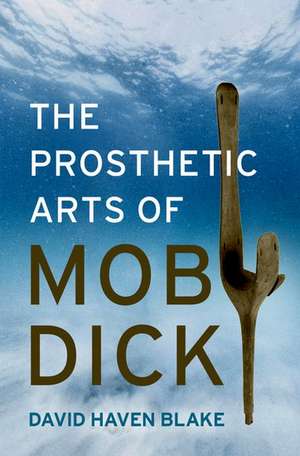The Prosthetic Arts of Moby-Dick
Autor David Haven Blakeen Limba Engleză Hardback – 4 feb 2025
Preț: 370.53 lei
Preț vechi: 510.53 lei
-27% Nou
Puncte Express: 556
Preț estimativ în valută:
70.90€ • 74.22$ • 58.67£
70.90€ • 74.22$ • 58.67£
Carte disponibilă
Livrare economică 05-11 martie
Preluare comenzi: 021 569.72.76
Specificații
ISBN-13: 9780197780510
ISBN-10: 0197780512
Pagini: 256
Dimensiuni: 165 x 239 x 26 mm
Greutate: 0.48 kg
Editura: Oxford University Press
Colecția OUP USA
Locul publicării:New York, United States
ISBN-10: 0197780512
Pagini: 256
Dimensiuni: 165 x 239 x 26 mm
Greutate: 0.48 kg
Editura: Oxford University Press
Colecția OUP USA
Locul publicării:New York, United States
Recenzii
Beginning with Ahab's wounding and limb loss, David Blake weaves together a disability aesthetics running through Moby-Dick and shedding light on American democracy itself: its identity inseparable from its vulnerability, its power inseparable from its projection of violence onto Islamic cultures. A must-read for Melville scholars, and for anyone interested in American literature.
Reflecting on the vulnerabilities of Captain Ahab, the iconic disabled figure in American literature, Blake offers a bracing reading of Moby-Dick. From his ivory leg to his bosom friend the Parsee Fedallah, Ahab relies on a set of assistive devices, or prostheses, that grant him a relational sense of being in the world. Though vengeful and destructive at last, Ahab's journey has defied ableism in both its antebellum and our contemporary iterations, and by so doing inspires us to revisit the novel, and the body politic it embodies, from the vantage point of the human and non-human, organic and inorganic, prostheses that animate the narrative. The book meets us at the intersection of disability justice and democratic reform; and as it transcends Ahab's mastery, the book envisions new ways of being and becoming with the Other within and beyond the US.
Blake's book ably appraises Melville's meditations on the value of psychological and racial aggrievement in the expression of American authoritarian power. It charts how Melville rendered the 'thump' of traumatic dismemberment into a prosthetic matrix for incorporating others into the violent extension of individual retribution and national power. The powerful readings of Fedallah and his mysterious gazes reembody him into a crucial prosthesis for Ahab, but also a phantom narrator for Ishmael and Melville, in ways that pilot new insights into how Moby-Dick remains premised on geo-political dispossession of Asians and Muslims. Blake's timely analysis of Melville's mediations of mutilated bodies makes this book a prophecy for readers to remember in today's vindictive times.
Reflecting on the vulnerabilities of Captain Ahab, the iconic disabled figure in American literature, Blake offers a bracing reading of Moby-Dick. From his ivory leg to his bosom friend the Parsee Fedallah, Ahab relies on a set of assistive devices, or prostheses, that grant him a relational sense of being in the world. Though vengeful and destructive at last, Ahab's journey has defied ableism in both its antebellum and our contemporary iterations, and by so doing inspires us to revisit the novel, and the body politic it embodies, from the vantage point of the human and non-human, organic and inorganic, prostheses that animate the narrative. The book meets us at the intersection of disability justice and democratic reform; and as it transcends Ahab's mastery, the book envisions new ways of being and becoming with the Other within and beyond the US.
Blake's book ably appraises Melville's meditations on the value of psychological and racial aggrievement in the expression of American authoritarian power. It charts how Melville rendered the 'thump' of traumatic dismemberment into a prosthetic matrix for incorporating others into the violent extension of individual retribution and national power. The powerful readings of Fedallah and his mysterious gazes reembody him into a crucial prosthesis for Ahab, but also a phantom narrator for Ishmael and Melville, in ways that pilot new insights into how Moby-Dick remains premised on geo-political dispossession of Asians and Muslims. Blake's timely analysis of Melville's mediations of mutilated bodies makes this book a prophecy for readers to remember in today's vindictive times.
Notă biografică
David Haven Blake is Professor of English at The College of New Jersey. He is the author of Walt Whitman and the Culture of American Celebrity and Liking Ike: Eisenhower, Advertising, and the Rise of Celebrity Politics, winner of the 2017 PROSE Award for the year's best book in Media & Cultural Studies.
